If you’re looking to find the absolute truth on a topic, go ahead and check out Reddit.
I’m saying this tongue-in-cheek.
But also, let’s be honest: Most of us trust Reddit far more than we trust the mishmash of ads and AI-generated responses that the internet regurgitates at us when we Google something.
I’m a search engine cynic. I’m a Reddit believer. I think that’s because Reddit, even when it’s wrong and dumb, at least seems to be real.
Anyway, the other day, a Million+ Streams member (and long-time reader of this newsletter) sent me a pretty fascinating Reddit post that claims to lay bare all of the mysteries of music marketing. The post was made two years ago, and it’s titled “What I learned from spending $5 million on music ads.”
Since I’m always searching for the absolute truth on music marketing, I was hooked. The whole post is too long to print in this email, but you can read it here, and you should, because it’s pretty thought-provoking stuff.
In today’s email, I’m going to give you two of my own thoughts in response.
(And if you are someone who doesn’t feel like reading several hundred words from a two-year-old random Reddit post this Monday – don’t worry, you don’t have to read the post for these ideas to make sense.)
First takeaway:
The internet – even dear, blessed Reddit – is often wrong.
The post signs off with this:
“Yes, I know the YouTube guys making money selling courses tell you that you need to run FB/IG ads. Just remember they make their money selling courses NOT running artist ad campaigns.”
I think I probably qualify as one of the “YouTube guys” this person is talking about.
Although I am in no way good at YouTube or particularly well-known on the platform, I have posted over a hundred videos there, many of which feature me stumbling through halting explanations of Facebook and Instagram ads while I fail to blink.
So, as a “YouTube guy,” a) I am mildly offended and b) I can tell you that the second sentence quoted above is just laughably false.
The data’s kind of nuts: I make about three times as much revenue running ads for artists as I do from selling memberships or courses. The math is so lopsided that I’ve considered just cutting all of my “educational products” to focus on building the ads agency.
(Cutting the educational stuff might be a good business decision… Maybe. But, due to a rationale that is probably too complicated and boring to spell out here, I think it would be a bad personal decision.)
At the risk of oversharing but in the interest of full transparency, here’s a live look at my current financial breakdown:
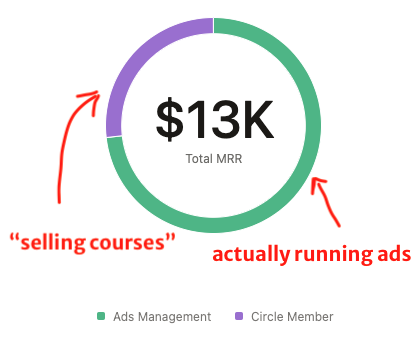
Seriously. It’s almost exactly 3:1 in favor of actually running ads.
Besides my own numbers, I’ve also talked shop with most of the people I’m assuming the post is actually referencing, and I can tell you that, for the larger YouTubers, the math is even more lopsided.
Some of these YouTuber agencies are doing millions per year managing Facebook and Instagram ads for music. The bulk of that spend is often from labels, so it’s not like these people are just ripping off indie artists at a higher price point.
Anyway. I read this post shortly after crunching some numbers with my finance person, and when I got to that last line about my money coming from selling courses, I literally laughed. It’s just a good reminder that every perspective is limited.
Okay, enough of that. Let’s get onto the thing I found most interesting.
Second (and main) takeaway:
Around-the-side marketing is cooler than direct marketing.
You can break down all marketing into these two categories:
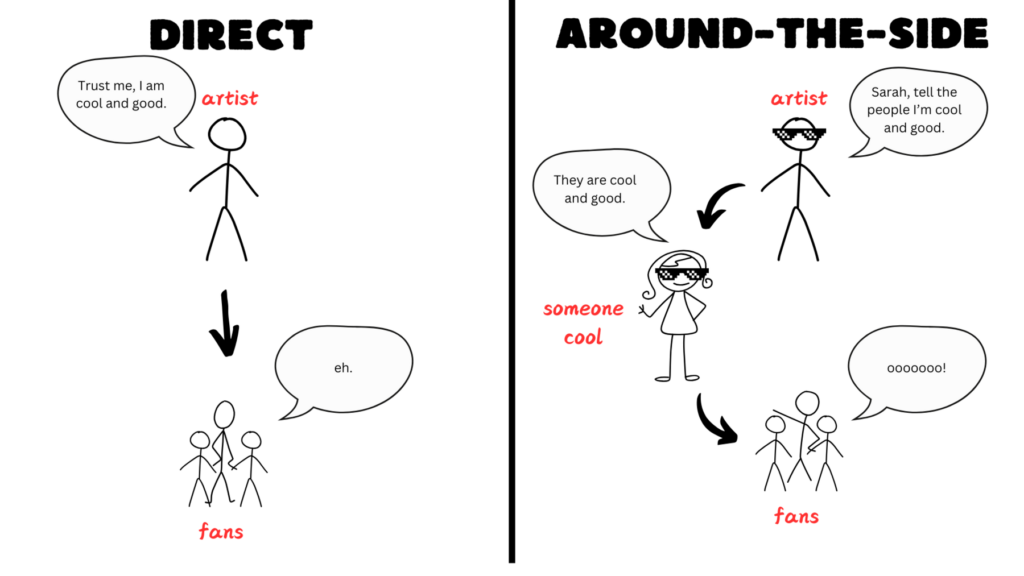
Before the internet, a lot more marketing was indirect / around-the-side. You might see an artist on a TV show, or on a cereal box, or as part of some other cultural artifact, and they’d be instantly validated by their association with the other established thing.
But in the world of social media, direct marketing is much more common. A large part of that is because (especially when you’re an indie artist) it’s usually way easier to do direct marketing than it is to get someone or something else to validate you.
As I read through the Reddit thread, I realized that a lot of the methods the user talks about are “around-the-side” tactics:
- Running display ads on major websites like NYT or HuffPost
- Teaming up with indie clothing brands
- Piggybacking your advertising off of larger bands
- Paying a writer to cover your music, then paying them to pitch it to the outlets at which they’ve written before
These ideas (and others) are compelling because they create marketing that doesn’t appear to come directly from the artist. You might call it “manufactured word of mouth”; the Reddit user calls it “buzz.”
It’s important because we tend to trust messages about a person more when they’re delivered by a third party – or, in other words, when they come from around the side rather than directly.
This principle is why witness testimony is so important in courtrooms. It’s also why we generally trust Reddit criticism (and why we generally distrust the brands that defend themselves against Reddit criticism).
Don’t get me wrong here; I’m not saying that direct marketing isn’t super powerful. It is. Plenty of artists have broken through by speaking right to their fans. But I am saying that direct marketing can’t convey the same level of authority or respect as indirect marketing.
You can be relatable with direct marketing. But you need someone else to say that you’re good and cool.
So, thanks to a random, two-year-old Reddit post, that’s my main idea for today.
I, like the other YouTube guys that this Reddit user mentions, am definitely guilty of talking much more about direct marketing (through Facebook and Instagram ads) than indirect marketing.
Sorry. My perspective is limited. Probably the best strategies combine both categories: They make the artist seem relatable and cool.
Just some food for thought. Hope it’s helpful as you market your own stuff this week. Maybe next week you can get Peyton Manning to do it for you.




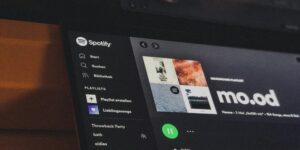
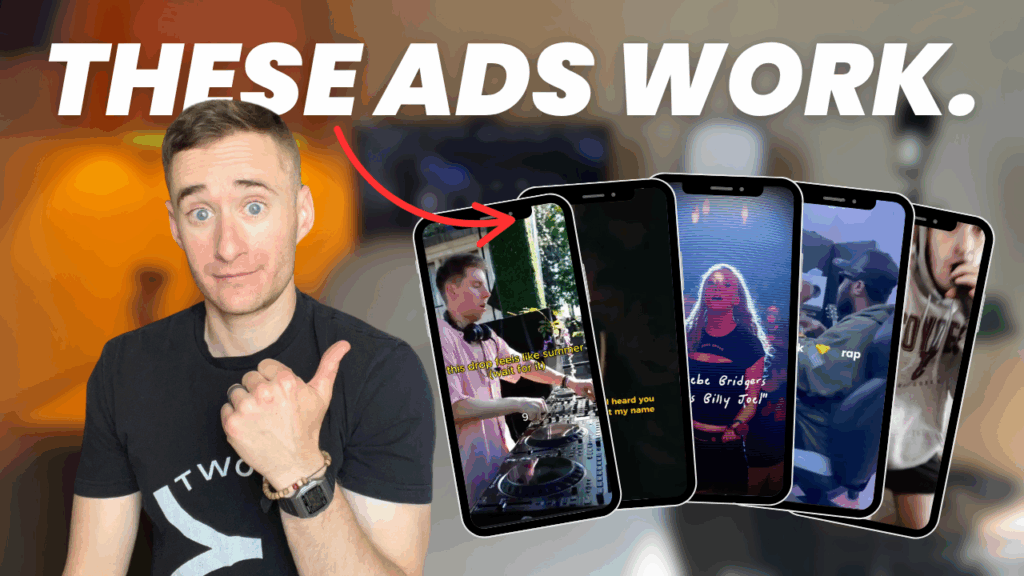
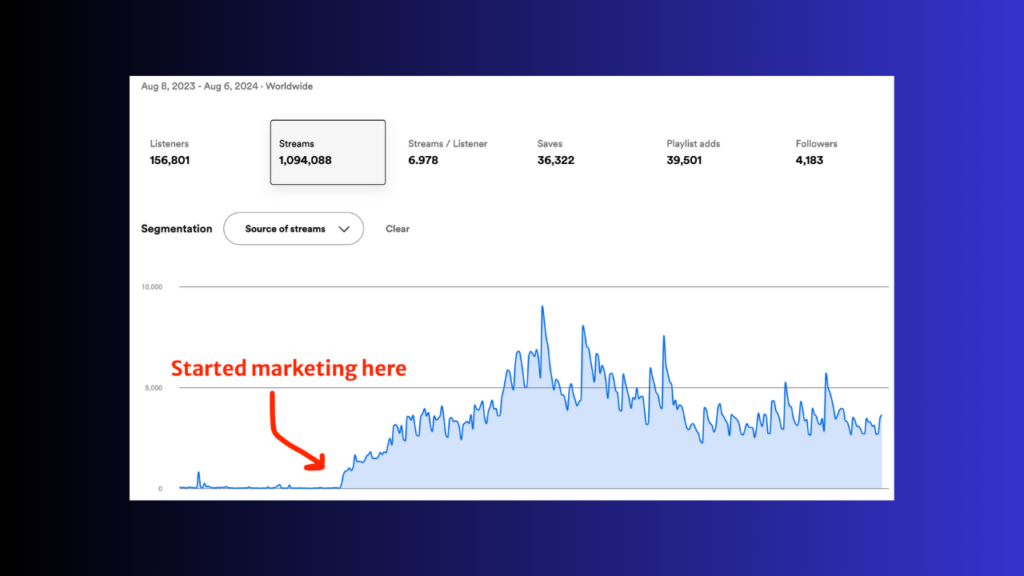

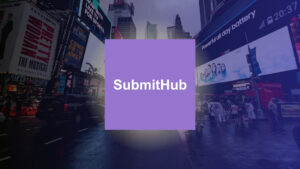

2 Responses
I think the main point that Reddit quote is trying to make is not whether you make money by selling courses or running artists ad campaigns. You are still making money by selling stuff to the artists. The point here is: are the artists making money? He says that buying social media ads to boost your spotify stats is not worth it for labels and indie artists and offers alternative solutions.
Of course if you are pouring money into advertising your music spotify you will see growth there. But he is making a valid point there: is that growth worth it?
What percentage of your membership clients are able to live off their music? And how many of them are working a day job and spending their money on their dream of making it in the music business one day?
Well, yeah – the Reddit poster’s main point is definitely not that little old Jon Anderson, specifically, is in the wrong ha. But the whole context of the thread is that he’s spent $5M on ads himself, so I don’t think he’s against spending money on social media or marketing.
Honestly, maybe 20% of my clients live full-time off of their music. If that’s the measurement of whether promo is worth it, then most promo is not worth it. Personally, I’d disagree with that as a premise, though. I’ve spent a bunch of money marketing my own music – it’s worth it to me to have my songs connect with people, even though I have no plans to be a full-time artist. But to each their own.